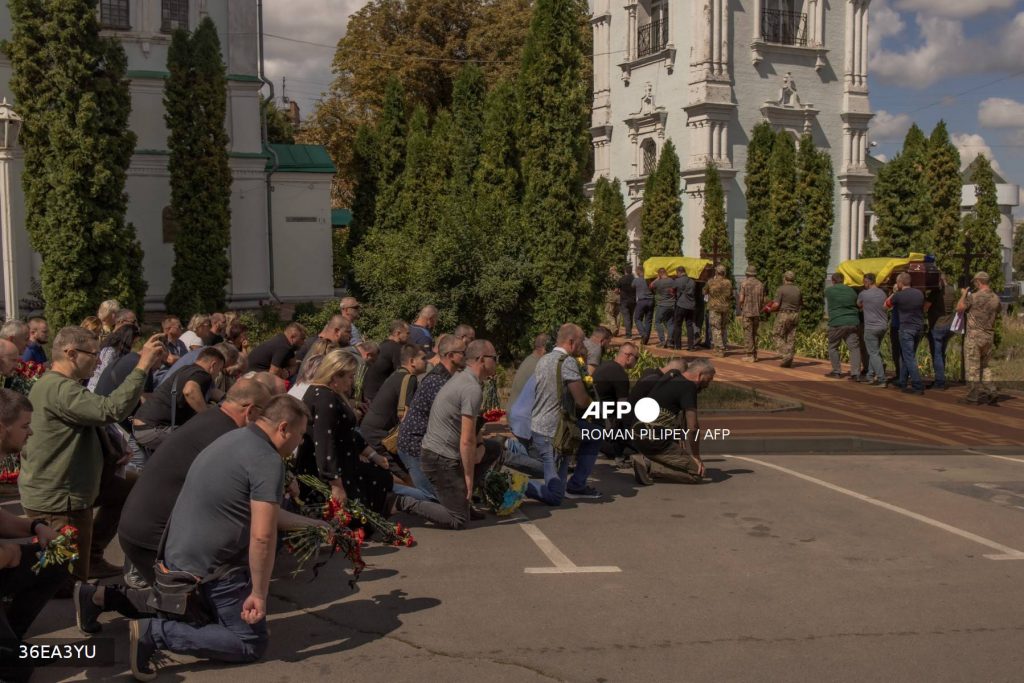Nina Golinyaeva struggled to finish her sentences, choking up as she recounted fleeing her town near the Russia-Ukraine border, under fire as Kyiv’s troops mounted a shocking cross-border offensive.
“I was very scared, very scared. Shells were flying from all sides. Helicopters, planes, and fighter jets were flying over the house,” she told AFP at an evacuation centre in Kursk city, the capital of the Russian region now under attack.
Golinyaeva is one of at least 120,000 people who have left their homes over the past 10 days as Kyiv’s forces press on with a surprise assault on Russian territory—the first by a foreign army since World War II.
Ukraine’s President Volodymyr Zelensky claimed on Thursday that his forces had taken full control of the town of Sudzha, where Golinyaeva lived, some eight kilometres (five miles) from the border.
“In the evening, I saw soldiers walking down the street. I asked them a question. They said, ‘You must evacuate urgently; otherwise, they will kill you,’” she recalled, describing her final hours in the town.
Dozens were crowded into the temporary accommodation centre in Kursk, 85 kilometres (53 miles) away, on Thursday when AFP visited.
Kyiv claims to have taken control of more than 80 settlements in the lightning incursion. The Russian governor of the Kursk region said on Monday that Ukraine had seized 28 settlements.
It was only on her way out of Sudzha that Golinyaeva realised the scale of Ukraine’s attack.
“There were burning cars all around, and pieces of drones or shells were lying everywhere,” she told AFP.
“Everything was thundering. The sky was illuminated by some kind of red light.”
‘Left Everything’
For Ukraine, the attack is a morale boost two and a half years after Russian forces launched their full-scale offensive on the country.
The Kursk incursion, they say, is giving Russian civilians a taste of what Ukrainians have been facing daily since February 2022.
At the centre for evacuees, Russian aid workers were distributing basic necessities and offering legal advice on navigating state support.
Under white tents erected by the Russian Red Cross, people hurried to collect donated clothing.
“We don’t know what to do. We cry day and night, every day. We don’t know what we are going to do,” said 70-year-old evacuee Zinaida Tarasyuk.
“We left everything… we have everything there,” she added.
Children played on the floor as the TV blared out yet another air raid alert.
Related News Russia repels 12 US-made missiles targeting Crimea bridge Ukraine offers Russia peace to end conflict China seeks truce as Ukraine advances in Russia offensive
“Stay at home if possible. Go into a room with no windows, with solid walls. Don’t go near windows,” the message on the screen advised. The children barely looked up.
The centre has its air raid shelter, which was locked shut.
‘Hope to Return’
Ukraine’s shock offensive has appeared to catch the Kremlin off guard.
Moscow’s response—both from the military and in the provision of humanitarian aid—has drawn some rare criticism inside Russia.
Officials in Kursk earlier this week advised people not to publish information online about relatives they were trying to track down or whose whereabouts were unknown.
They said it would play into Ukraine’s hands, though regime critics suspect an attempt to obscure the number of missing people.
According to the latest official figures, issued on Monday, Russia has counted 12 civilians killed and 121 wounded.
Those who managed to flee described a chaotic exit from border areas.
“When we wanted to leave, there were our broken tanks, which were on fire,” said Inna Pereverzeva, a 50-year-old salesperson evacuated from the district around Sudzha.
“We went the other way, and everything was wrecked there. We barely got out,” she added.
Ukraine has stated it does not want to annex Russian territory. However, it is unclear how long they will try to hold on to the land.
Earlier this week, Ukraine’s army set up a military office to “ensure order” and meet “the needs of the local population.”
In Kursk city, many who fled are awaiting the chance to return.
“We don’t have anything. We just got in our car and left,” said Lyubov Bonareva, 53.
“Now we are dependent on our daughter and son-in-law. We hope to return home.”
AFP

